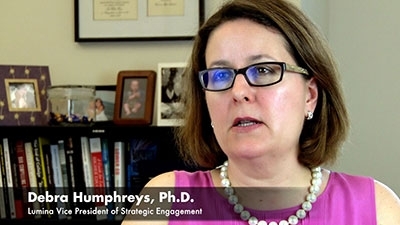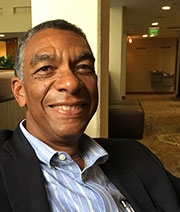Lumina Foundation is committed to helping more Americans receive education and training beyond high school to build the talent pool our nation needs. To ensure that our efforts succeed, it is imperative both that more individuals of all backgrounds gain access to opportunities to learn beyond high school and that credentials they earn are of high quality. But, what does that mean? How can we ensure that all credentials awarded have clear and transparent learning outcomes, lead to good jobs, and put people on pathways for long-term success as lifelong learners?
Existing systems of quality assurance in the United States might not be up to this task. They were built for another time and for a student cohort very different from today. Too many of the structures in place to assure the quality of institutions and the credentials they award focus only on inputs and out-of-date structures, and too few are squarely focused on student outcomes—including the outcomes important to employability and long-term success.
A new project supported by Lumina Foundation is exploring what the next generation of quality assurance might look like. The Quality Assurance Commons is a new organization dedicated to exploring, developing, and testing alternative approaches to quality assurance that respond to the changing landscape of higher education and, more broadly, postsecondary education. It will serve the needs of learners, employers, and society. As part of this effort, the project’s first step has been the creation of a draft set of Essential Employability Qualities, or EEQs. These are qualities credential holders should develop to be positioned for success after graduation. They would be applied in an innovative program-level certification process to assure that graduates are well-prepared for the 21st-century workforce.
At a meeting in Atlanta last week on “The Essential Employability Qualities Certification Pilot: Co-Designing A Meaningful, Feasible, and Valuable Process,” the project launched its initial pilot with 27 programs from 14 institutions that will work together to refine the criteria, test the evidence, and develop an EEQ Certification. The pilot programs represented a wide range of disciplines and modalities from two- and four-year institutions, with the goal of developing a process that works across disciplines and institutional types.
Schools seeking to match their graduates’ skills to the needs of the modern workplace need to act quickly, speakers at the meeting said.
“We’re at the front end of trying to build a framework for work-related EEQs,” said Ralph Wolff, president and founder of The QA Commons and former president of the WASC Senior College and University Commission.
“Our project is designed to build on the program and institutional outcomes already established and incorporate high quality, work-related outcomes to assure that graduates are well-prepared to meet the needs of the changing world of work, as well as society. We will be taking a developmental approach—a process that recognizes we’re at the front end of a long-term shift in focus for many higher education institutions and programs. At the same time, many programs have already made good progress in this area, and we want to be a forum to share best practices.”
In addition to a high-level Advisory Board, The QA Commons has also established employer and student working groups to ensure the EEQs and processes meet their needs, he said.
Sally Johnstone, president of the National Center for Higher Education Management Systems (NCHEMS), emphasized the need to act now on EEQs, which help signal that graduates are job-ready. “We’re in a time when something has to change, because the old system is not working,” she said. “We have to think about what the essential skills of a graduate are.”
Aaron Thompson, a member of The QA Commons Advisory Board, is executive vice president and chief academic officer for the Council on Postsecondary Education in Kentucky. Last year he served as interim president of Kentucky State University.
“In my current role, I have to deal with employers, universities, students. I have to deal with the legislature and the governor’s office. And dealing with all those expectations is complicated,” he said.
“We need to be preparing students to exist in a digital world, a world that is ever-changing—not only in terms of demographics but even in some of the jobs that we don’t even understand yet.”
Thompson said it’s important to get started with EEQ certification. No one should expect the system to be perfect from the outset, he said, adding that like the students themselves, institutions should be developing continuous-improvement models.
“We’re also going to have to figure out what it means to say they are gaining these skills,” Thompson said. “How do we know that they are becoming competent to the point where we would feel comfortable to send them out there?”
Education must change because students and the nature of work itself have changed dramatically, said advisory board member Bob Jones, president of Education and Workforce Policy LLC, and a former assistant secretary of labor under President Ronald Reagan and under President George H.W. Bush.
“Jobs used to be monolithic,” he said during a break in the conference. “You learned a skill and you worked your way up.
“Now our jobs have gone horizontal. You come in with a single job title, but you have responsibilities in three or four different areas. There are fewer people, and broader responsibilities.”
That actually makes work more interesting, he said. But it also means graduates must have a broad array of problem-solving skills and social maturity.
“And fundamentally, we haven’t changed our education system to meet that new world,” Jones said.
“We have some schools that are responding tremendously and have partnerships with industry. And you have others doing the same old thing. The student is caught, doesn’t know what’s going on. The employer is looking at all these credentials and trying to figure out what can these people do.”
An EEQ Certified program could help answer that question.
“You have to show the employer something. You have to show them, this is what we’re doing. Does this work, does this make sense?”
Jones said he routinely hears from business leaders who feel academics aren’t really listening to them. Without EEQs or similar tools, he said, “We’re just talking past each other.”
“Employers are tired of advisory committees. Because they’re told on every advisory committee, ‘Oh, we’re already teaching essential skills.’”
The need for better communication goes both ways, he said.
“Have we told the education system that this is what’s going on? No. We get mad at them because they’re not producing. But do we have a system in this country for mining the workplace and communicating to educators? No.”
Thompson said institutions will face increasing pressure to change.
“We have to understand what this means to the academy,” he said. “If we don’t do it, somebody else will. And it won’t be the federal government. It’s going to be some of the people in my state and other states who are going to tell us what this looks like and what it means.
“And I promise you, if we don’t do it, we will not like what we get.”
The key is to try to create a new system knowing that it will be improved as more is learned.
“We are building a new way of doing business,” Thompson told the group. “We’re engaging employers and students in this conversation.
“Let’s not forego the good by trying to be perfect,” he said. “Let’s make the good happen, and if we do it the right way, we’ll be closer to perfect.”
For more information see www.theqacommons.org.

 Aaron Thompson, executive vice president and chief academic officer for the Council on Postsecondary Education.
Aaron Thompson, executive vice president and chief academic officer for the Council on Postsecondary Education.